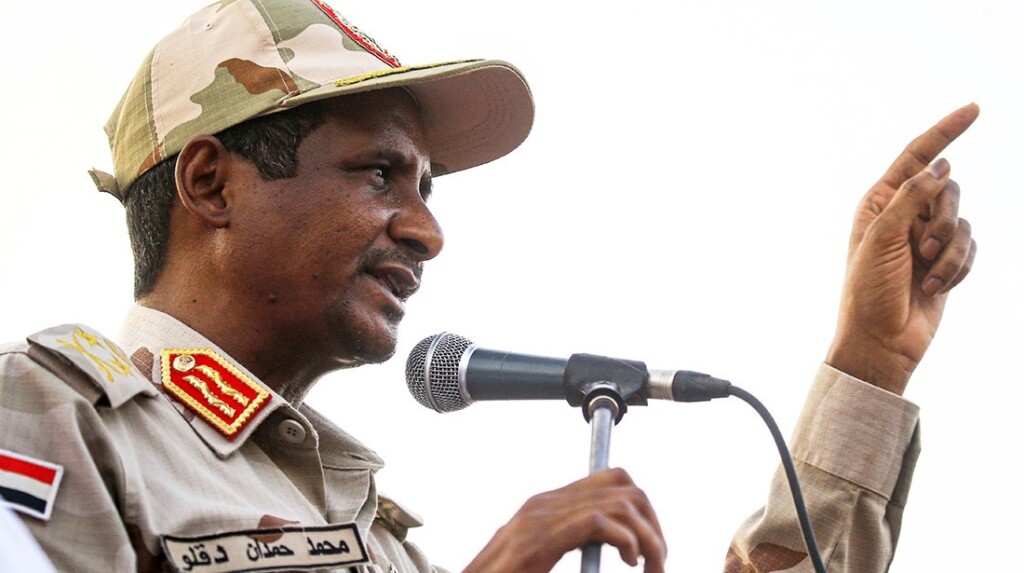RSF Commander Hemedti: ‘If we wish, we can be in Port Sudan today’

Lt Gen Mohamed 'Hemedti' Dagalo, Commander of the Rapid Support Forces (File photo: SUNA)
In a speech posted on social media yesterday, Gen Mohamed ‘Hemedti’ Dagalo, commander of the paramilitary Rapid Support Forces (RSF), strongly denounced the “creation of an alternative capital” in Port Sudan, capital of Red Sea state, and threatened to set up “a genuine civilian authority” in the areas under its control, with Khartoum as capital.
Hemedti in his speech yesterday repeated the RSF stance that the fighting that broke out between the RSF and the Sudan Armed Forces (SAF) in Khartoum on April 15, was instigated by “remnants” of the regime of Omar Al Bashir (1989-2019).
He referred to “an old plan” of Gen Abdelfattah El Burhan, SAF commander and president of the Sovereignty Council, “to become dictator-president, and he orchestrated all of this with the remnants of the former regime”. El Burhan “embarks on foreign tours trying to impersonate the head of state, despite lacking legitimacy, and they intend to declare a government in part of Sudan”.
Former high-ranking members of the Al Bashir regime, are allegedly working, together with the SAF, to seize power again. “The influence of prominent figures linked to the administration of former autocrat Omar al-Bashir and movements connected to it has been growing in Sudan,” and “have lined up behind the Sudanese army,” Mohammed Amin explained in a report in Middle East Eye (MEE) in August.
In July, political blocs allied with the former regime of Al Bashir, called on El Burhan to form a caretaker government. Malik Agar, vice-president of the Sovereignty Council, has also urged the establishment of such a government.
The RSF commander pointed to plans of the acting government (established after the joint SAF-RSF coup d’état in October 2021) “to establish a conference centre, build presidential villas, and a permanent headquarters for the Ministry of Foreign Affairs” in Port Sudan, and warned that these plans will divide the country.
He warned for the division of the country, pointing to the Hamdi Triangle* proposal in the 1990s, but at the same time said that in case “the remnants form a government [in Port Sudan], we will immediately initiate broad consultations to establish a genuine civilian authority in the areas under our extensive control, with Khartoum as the capital.
“We will not permit the creation of an alternative capital,” he threatened. “If we wish, we can be in Port Sudan today.”
Since the war erupted in the Sudanese capital in mid-April, ministries, ambassies, UN agencies, and organisations are working from temporary offices in Port Sudan.
Earlier this month, Hemedti stated that the RSF maintains a significant presence in Khartoum state, emphasising that they have “no intentions of seeking control over Sudan”. The RSF’s stance is not against the SAF, he said, but rather against what he referred to as the “remnants of the former regime”.
* In the 1990s, Finance Minister Abdelrahim Hamdi proposed to concentrate most investment in Sudan in places within a day’s drive of Khartoum. He argued that this region could prosper without having to administer the troublesome peripheries that served chiefly as labour reserves. Until Al Bashir’s ouster, every Sudanese leader since independence hailed from the Hamdi Triangle formed by the cities of Abu Hamed, Khartoum, and Shendi in the Nile Valley, home to Arab-identifying ethno-linguistic groups (the so-called riverain elites). Khartoum and surrounding areas have been the focus of almost all non-oil related investment in the country since the end of the 1990s.











 and then
and then